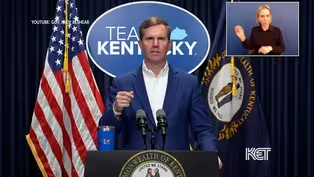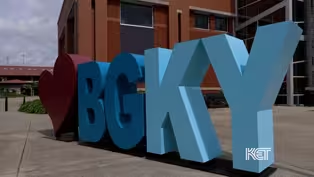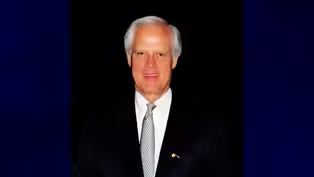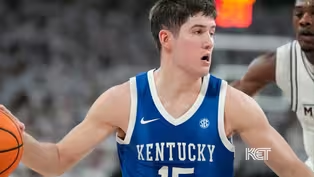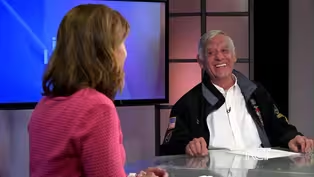
Lights Out Louisville Seeks to Protect Migrating Birds
Clip: Season 2 Episode 231 | 4m 29sVideo has Closed Captions
Lights Out Louisville is asking Louisvillians to do their part in protecting birds.
Lights Out Louisville is asking Louisvillians to do their part in protecting birds from light pollution which can disorient them and lead to building collisions and death.
Problems playing video? | Closed Captioning Feedback
Problems playing video? | Closed Captioning Feedback
Kentucky Edition is a local public television program presented by KET

Lights Out Louisville Seeks to Protect Migrating Birds
Clip: Season 2 Episode 231 | 4m 29sVideo has Closed Captions
Lights Out Louisville is asking Louisvillians to do their part in protecting birds from light pollution which can disorient them and lead to building collisions and death.
Problems playing video? | Closed Captioning Feedback
How to Watch Kentucky Edition
Kentucky Edition is available to stream on pbs.org and the free PBS App, available on iPhone, Apple TV, Android TV, Android smartphones, Amazon Fire TV, Amazon Fire Tablet, Roku, Samsung Smart TV, and Vizio.
Providing Support for PBS.org
Learn Moreabout PBS online sponsorshipDid you know that on the night of last year's Derby, almost 4 million migrating birds flew over Jefferson County alone?
That's just one night of the spring migration, and birds are especially vulnerable during this time.
Lights out.
Louisville is asking Louisville Jones to do their part in protecting birds from light pollution, which can disorient them and lead to building collisions and death.
This spring reminds me of the A book, a very influential book called Silent Spring that was written by a scientist, Rachel Carson, about 60 years ago.
And in it, she warned us that our springs were becoming silent because we were losing birdsong.
We have 3 billion birds, fewer than we had in 1970, and that's been mostly due to habitat loss.
But a lot of that loss is also due to deaths during bird migration.
We lose a billion birds in the US and Canada every year to building collisions, mostly at night due to city lights.
They start circling areas that are well lit and circle and circle and circle until they get exhausted and then just collapse into city locations which aren't going to be safe for them.
Luckily, though, there are a lot of steps and actions we can choose to take if we want to.
And that's where lights out.
Louisville comes in, lights out.
Louisville is really an opportunity for everyone in our community to be part of the solution.
So what does that mean?
There are really simple things that you can do to turn lights off between 11 p.m. and 6 a.m., especially during peak migration times, which in the spring is April through May, and in the fall again, it would be September to October.
Things that people can do.
Ah, turn your outside lights off.
If you have blinds, shutters, curtains, you can close those to help keep inside light in so there's not the light glare spilling out outside, put lights on motion detectors, which is really the best thing you can do, because then lights only come on when they're needed.
Shading, setting lights downwards, or using Shield's light shield.
So that light is directed down just to what you need it to be on.
And it doesn't spill out up into the night sky, adding to the light pollution.
And we do ask that people use warmer colored bulbs rather than those bright LED blue or white bulbs that are blinding.
Even though we're focusing on home people, homeowners right now, we are working with downtown building owners and managers in hopes that they will be on board with Light the Lights Out program as the fall migration comes up.
And we're hoping that we can rally people to help save our birds because they do a lot for us that we don't realize where they are in the food chain.
They eat a lot of insects, some of them are pests in our agric for agricultural crops or forests, you know, caterpillars of various kinds, chickadees.
They're small woodland birds, but they're in our neighborhoods, one nest of nestlings.
Those parents have to go out and catch 6 to 9000 caterpillars for one nest of maybe 6 to 9 little babies.
They really are important eaters of things that would otherwise get out of control.
And the nice thing about lights out is everyone can participate.
You know, it isn't like, oh, some decision maker somewhere a politician or a conservation manager or whatever.
It's everyone can play a role, which I think a lot of people like knowing that that they too can take individual action and and help nature because nature helps us a lot.
Cutting off lights isn't just good for the environment.
It's also a cost saver, according to the U.S. Energy Information Administration and Kentucky and nearby states.
Lighting is in office buildings.
Highest energy consumption cost averaging about 30%.
Video has Closed Captions
Clip: S2 Ep231 | 1m 48s | Governor Andy Beshear has signed what's been dubbed the "Momnibus" bill. (1m 48s)
Bowling Green Recognized Nationally for Economic Development
Video has Closed Captions
Clip: S2 Ep231 | 3m 10s | The city of Bowling Green is being recognized nationally for economic development. (3m 10s)
Former Kentucky State Auditor George Atkins Dies
Video has Closed Captions
Clip: S2 Ep231 | 26s | George Atkins was a Democrat who served as state auditor from 1976 to 1980. (26s)
Licensing Date for Medical Cannabis Moved Up
Video has Closed Captions
Clip: S2 Ep231 | 32s | Businesses can now apply for Medical Cannabis licenses starting in July. (32s)
Reed Sheppard is Leaving Kentucky Wildcats
Video has Closed Captions
Clip: S2 Ep231 | 34s | UK's Reed Sheppard will not be sticking around for the Mark Pope era. (34s)
What to Expect for Thunder Over Louisville This Year
Video has Closed Captions
Clip: S2 Ep231 | 2m 44s | Thunder over Louisville has been lighting up the skies for the past 35 years. (2m 44s)
Providing Support for PBS.org
Learn Moreabout PBS online sponsorship
- News and Public Affairs

Top journalists deliver compelling original analysis of the hour's headlines.

- News and Public Affairs

FRONTLINE is investigative journalism that questions, explains and changes our world.












Support for PBS provided by:
Kentucky Edition is a local public television program presented by KET
